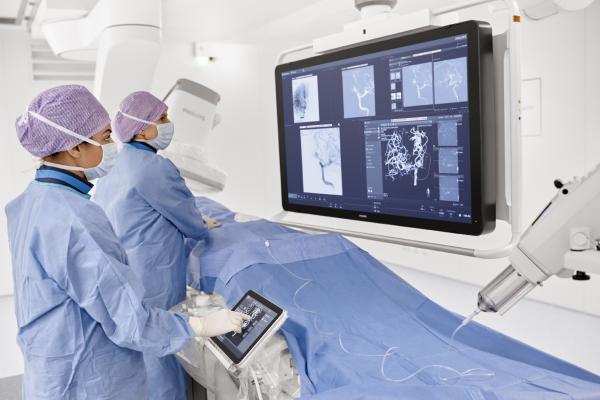
September 1, 2020 — Philips announced its next-generation Philips Azurion image-guided therapy platform, marking an important step forward in optimizing clinical and operational lab performance and expanding the role of image-guided interventions in the treatment of patients. Intuitive, integrated and efficient, the next-generation Azurion advances the capabilities of the platform to further improve the quality and efficiency of interventional procedures. The Azurion platform has already achieved rapid global adoption and has been used in over two million procedures worldwide since its introduction three years ago.
In the past few decades, clinical practices around the world have evolved to successfully treat more patients and perform more complex procedures in interventional labs. However, with more staff and technologies involved during these procedures, interventional lab environments can become crowded and cluttered. In order to enhance clinician focus and control during procedures, Philips has integrated all the essential lab systems and tools into this new version of the Azurion platform, making it an important step forward in lab integration.
The Philips Azurion image-guided therapy platform now integrates control of imaging, physiology, hemodynamic and informatics applications, as well as intuitive control of the gantry, at the tableside, allowing clinicians to control all compatible applications from a single touch screen while performing procedures. This can eliminate the need for clinicians to leave the sterile field and step into an adjacent control room, as well as supporting faster and better informed decision making.
Simplifying 3-D imaging during interventional procedures
With this next-generation Azurion platform, Philips is also introducing a new 3-D imaging solution called SmartCT. With SmartCT, users are guided through the image acquisition and can review and interact with the acquired CT-like 3D images on the tableside touch screen module using 3-D visualization and measurement tools. These tools have been designed to support procedures in a range of clinical domains, including neurology, oncology, and cardiovascular procedures. The use of 3-D imaging such as 3D RA or Cone Beam CT during interventional procedures has been shown to improve outcomes and reduce radiation dose for both staff and patients.
“Our aim as an innovation company and global market leader in image-guided therapy is to push the boundaries and set new industry standards for delivering an outstanding experience for clinicians, helping them to deliver superior care to every patient,” said Ronald Tabaksblat, General Manager Image Guided Therapy Systems at Philips. “This next-generation Azurion makes routine cardiovascular procedures more efficient and supports the development of new minimally-invasive techniques to treat complex diseases such as stroke, lung cancer and spine disorders.
"The integrated platform enables us to efficiently carry out complex interventions at any time using a wide range of functions such as IVUS and iFR co-registration,” said Alexander Becker, M.D., head of the cardiac catheter laboratory at the Robert Bosch Hospital in Stuttgart, Germany, and one of the first hospitals to experience the new platform. “The use of the control panel by the examiner is intuitive, combining different sources of information to make patient evaluation much easier and faster.”
Seamless control and workflow during procedures
With the new Azurion platform, clinicians can easily switch between imaging, physiology, hemodynamic and informatics applications, including SmartCT and IntraSight – a comprehensive suite of clinically proven iFR, FFR, IVUS and co-registration modalities. Fully automatic position control enables clinicians to intuitively control the position of the gantry and table, as well as choosing from a wide range of stored parameters. The new Azurion also includes advanced cybersecurity features, new high-definition image display capabilities, and advanced remote and proactive services. The platform is available in three versions: complementing the Azurion 3 and 7 variants, Philips now also offers the Azurion 5 to facilitate even more tailored solutions to address specific customer needs. For more information visit www.philips.com/azurion.


 February 13, 2026
February 13, 2026 









